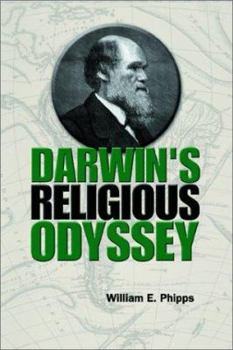Darwin's Religious Odyssey
Select Format
Select Condition 
Book Overview
Darwins detractors tend to depict him as an anti-religious man determined to undermine biblical faith. Not so, says William Phipps, in this exploration of Darwins religious struggles, based on Darwins journals.
Format:Paperback
Language:English
ISBN:1563383845
ISBN13:9781563383847
Release Date:September 2002
Publisher:Bloomsbury Academic & Professional
Weight:0.80 lbs.
Dimensions:0.6" x 5.9" x 8.9"
Customer Reviews
3 ratings
Darwin was an agnostic
Published by Thriftbooks.com User , 16 years ago
This is an excellent book; I have no doubts about it. William Phipps has done a fine job in presenting a compact, detailed overview of the life and religious views of Charles Darwin. Darwin was an agnostic, or became an agnostic when he rejected or questioned conventional Christian doctrines, and remained uncertain about whether there existed a Creator or Designer. Note, this does not mean that Darwin was hostile towards religion or towards Christianity. In fact, Darwin maintained a healthy respect for religion and Christianity into his later years. He does seem very clearly, however, a self-professed agnostic, unsure of or critical about religious or specifically Christian doctrines, but not an atheist, and not hostile towards religion. This much Phipp's truly scholarly and compact book makes clear. Phipps has done a fine job, and this makes great introductory reading for anyone interested in the topic of Darwin's religious views, or the compatibility of Christianity with evolution (Phipps also suggests they are compatible). There is also some fine material here on Darwin's peers such as Asa Gray, the Harvard scholar and Christian who accepted Darwinian theory, as well as Thomas Huxley, the famous agnostic.
Deserves a wide readership
Published by Thriftbooks.com User , 18 years ago
In the midst of the culture wars over creation versus evolution, this book deserves a wide readership beyond those interested in Darwin as a person and scientist. This is not narrowly limited to Darwin's personal beliefs, but discusses theological responses to such issues as biblical literalism and the comprehensibility of god. The focus is on Darwin's period, but Phipps also reaches back to early Christian theologians and forward to present thinkers. It is, on the one hand, encouraging to see such a passionate middle ground, and on the other discouraging to see that the same battles are repeatedly fought. I wish that I had been steered towards such profound and subtle thinkers during my own crisis of faith. Darwin is such a major cultural figure and so abundantly documented that it is impossible to do justice to him in a single biography. I therefore welcome such specialized biographical works, particularly in the hands of someone as careful and thoughtful as Phipps. I read the book with great interest and have been left with considerable food for thought. Michael Ruse has written some complementary books on similar topics, including The Evolution-Creation Struggle.
Puts a human face on Darwin
Published by Thriftbooks.com User , 21 years ago
Very interesting and readable account of how Darwin's views on religion and evolution developed over the course of his life. As well as being a towering figure in modern science, Darwin was also a highly principled and compassionate person, as this book makes clear. He struggled all his life with the contradiction between the orthodox Christianity he espoused as a young man and the ideas that science inevitably lead him to, and this may have been a factor in his persistent ill health. It is outrageous that a man as brilliant and humble as Darwin has been so villified by ignorant bigots with anti-scientific agendas. Far from being a racist as hypocritical biblical creationsists often claim, Darwin hated racism and slavery, and longed for the day when all men would see each other as brothers:"As man advances in civilisation, and small tribes are united into larger communities, the simplest reason would tell each individual that he ought to extend his social instincts and sympathies to all the members of the same nation, though personally unknown to him. This point being reached, there is only an artificial barrier to prevent his sympathies extending to the men of all nations and races." (The Descent of Man)Darwin (and Phipps) also explode the idea that the theory of evolution preaches selfishness and apathy towards one's fellows:"Darwin thought of humans more as protectors of one another than as predators on one another. When two tribes are in competition, he stated, the one that warns its members of danger and engages in mutual defense is more likely to succeed. The 'fittest' are not necessarily the brawniest, nor even those who sire the most offspring, but those who live cooperatively." (Chapter 6)The point is also made that a god-magician who must continually interfere with the universe in order to keep it going smoothly is less worthy of worship than one who works indirectly by allowing the full potential of the universe to unfold through scientific law - a point always lost on the biblical creationists. It's a pity that these "creationists" are the people who most need to read this book but are the least likely to do so.




